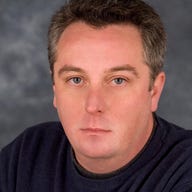Apple blows 'em away... Q1 profits of £75m

Apple Computer Inc. continued its impressive turnaround Wednesday when it shattered analysts' estimates by 8 cents a share in its first fiscal quarter. The PC maker pocketed $123m (£75m), or 78 cents a share, on sales of $1.7bn (£1.04bn). First Call consensus expected Apple to earn 70 cents a share in the quarter.
Its shares closed up 3/8 to 46 1/2 ahead of the earnings report.
The $1.7 billion in sales represents an 8 percent improvement versus the year-ago quarter when it earned $47m (£28.7m), or 33 cents a share, on sales of $1.57bn (£0.96bn). For the first time in 11 quarters, Apple improved its quarterly sales on a year-over-year basis. Including a $29m (£18m) after-tax gain from the sale of 2.9 million shares of ARM Holdings Plc, Apple earned $152m (£92.7m), or 95 cents a share in the quarter.
Company officials said it sold 519,000 iMac computers in the quarter, driving overall unit growth to 49 percent year-over-year. "Unit growth year-over-year was three to four times higher than the industry average," said Steve Jobs, Apple's interim CEO in a prepared release. "In addition, Apple ended the quarter with only two days of inventory, besting industry--leading Dell's seven days of inventory." Next to the emergence of the Internet, Apple's impressive turnaround must rank as the top story on Wall Street this year.
In the year-ago quarter, Apple stunned Wall Street by posting a profit of $47m, or 33 cents a share, on sales of $1.57bn. The reversal interrupted a six-quarter losing streak over a period that saw Apple lose more than $1.8bn (£1.1bn). Impressed as they were, analysts saw the surprise profit as merely the end result of massive cost cutting. Indeed, Apple did layoff more than 7,000 employees through those dark days, more if you count contractors and temporary workers.
"The difference between Apple today and Apple of last year is enormous," said Louis Mazzucchelli, an analyst at Gerard Klauer Mattison. "What's not different? They cut their costs, have some hot products and have recaptured the market's imagination." Mazzucchelli was right on the mark when he predicted Apple would post a profit of 78 cents a share in the quarter. "They had a lot of diamonds in the rough," Mazzucchelli said. "With Steve Jobs' charisma and the complete overhaul of its business model, they were able to make them shine." Most of that optimism is derived from the record sales of its hip iMac PCs. Apple told the MacWorld trade show last week that 800,000 iMacs have been sold in less than half a year, making it one of the most successful computer launches ever.
Combining the prowess of the iMac with its popular G3 machines, Apple now finds itself in a position to expand gross profit margins rather than beg for a small piece of market share. Apple's stock price reflects this renaissance. One year ago, the stock closed at 18 1/8 ahead of the first-quarter earnings report. Some said even that price was too steep considering it had just reported a loss of $161m (£98.2m), or $1.26 a share, on sales of $1.61bn (£.98bn) in the fourth quarter of 1997. Now, 10 of the 19 institutional investment firms following the stock rate it a "buy."
For all the rosy sentiment, however, there's a sense that Apple might be on the verge of running out of steam. "Apple's at a peak right now," said Jim Poyner, an analyst at CIBC Oppenheimer. "They are likely to see a plateauing of iMac shipments going forward and that is going to make the stock a lot less interesting." And as hot as the iMac is now, it's become Target No. 1 for competitors in the low-priced, entry-level market.
Apple also must improve its market share--currently about 5 percent worldwide--to attract more developers to its platform. But Rome wasn't built in a day. "I think you'll see higher profit margins and more innovative products as the year goes on," Mazzucchelli said. "I told people Apple wasn't dead a long time ago and now they are finally starting to listen."